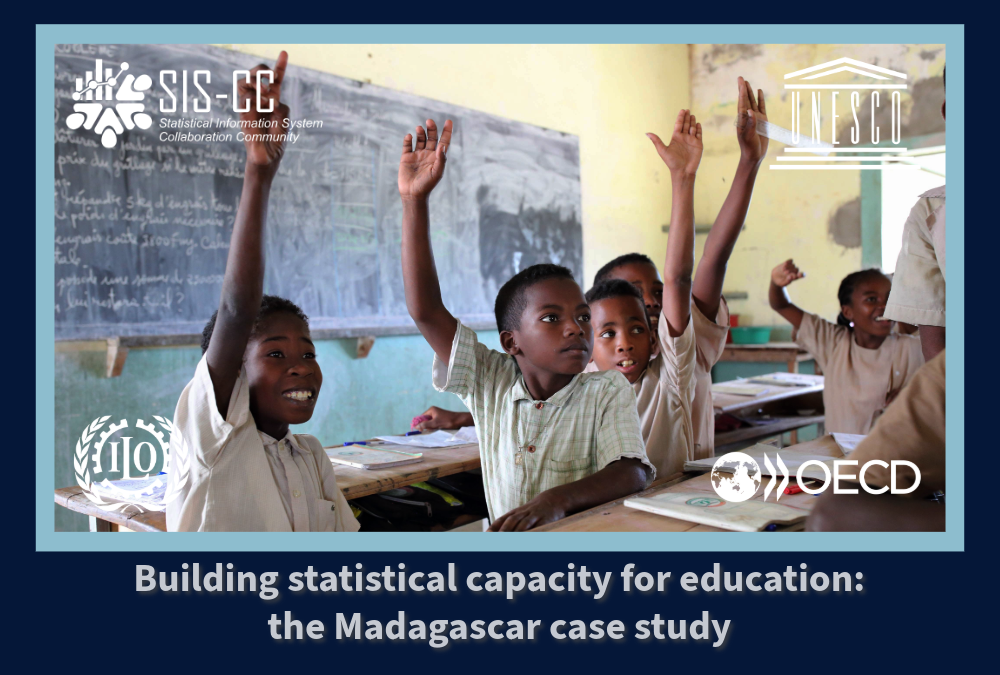
In 2024, the Ministry of National Education (MEN) of Madagascar, in partnership with the United Nations Educational, Scientific and Cultural Organization (UNESCO), the International Labour Organization (ILO) and the OECD launched a pilot project to strengthen its statistical infrastructure. The goal: to build national capacity in SDMX data modelling and experiment with the .Stat Suite, laying the foundation for improved data governance, interoperability, and evidence-based education planning.
The project, carried out between January and September 2024, was conducted as part of UNESCO’s Projet d’Appui à la Planification de l’Éducation et au Système d’Information (PAPESI) and supported by the Community and its tools.
Understanding the context and challenges
The project began with a discovery phase, including a kick-off workshop and a dedicated “as-is” online session with MEN’s 12 data practitioners. Using a structured framework, participants explored current practices in:
- Data collection and transformation
- Metadata governance and reporting
- Tool usage and statistical skills
Building skills through .Stat Academy
Participants enrolled in .Stat Academy for online, self-paced training in SDMX fundamentals and data modelling practices, completing a number of courses, including:
- Introduction to SDMX for Data Producers
- SDMX Vocabulary for Beginners
- Introduction to SDMX Structural Modelling
MEN staff demonstrated high engagement, completing certifications and preparing for deeper in-person hands-on workshops with their own data.
“The modules are an essential resource for mastering the specific language used in SDMX. With detailed explanations and concrete examples, they provide an in-depth understanding of the terminology.”
Fanilo Ambinintsoa Andriamora (Madagascar Ministry of National Education)
Hands-on experimentation with the .Stat Suite
A 3-day onsite workshop in Antananarivo followed, supported by a dedicated sandbox .Stat Suite environment installed. MEN practitioners applied what they learned to actual data, completing a step-by-step process:
- Analysing a MEN questionnaire to design the structural model,
- Designing the SDMX concepts, codelists, and data structures using the SDMX Matrix Generator,
- Mapping the questionnaire’s data to the new structure and transforming the data using the SDMX Convertor,
- Loading the data and structures into .Stat Suite, and configuring the data dissemination.
The sessions concluded with next-step assignments, governance discussions, and feedback via a survey—laying the groundwork for broader institutional adoption. MEN practitioners continued their training at the OECD hosted SDMX Regional Workshop in December 2024, in Istanbul. In addition, the outcomes of the project will be presented at the 2025 SDMX Global Conference at the end of September 2025.
This pilot proved that small-scale, well-supported interventions can have lasting impact. MEN now possess a core team of trained data practitioners, a working prototype data model, and a roadmap for implementing robust SDMX-based workflows in the education sector.
The project reflects the power of international collaboration—UNESCO for strategic leadership, ILO for infrastructure, and OECD for technical guidance through open source community tools and a standardised SDMX data modelling practice. As MEN looks ahead, the knowledge and tools gained through this project will support better education planning, policy, and public accountability.
“Through the Community and the .Stat Academy online learning platform, we can lay the groundwork for technical assistance and capacity-building projects that would be impossible to achieve with traditional approaches.”
David Barraclough (OECD Statistics and Data Directorate)
As the Community continues to promote interoperable, scalable, and country-owned solutions, Madagascar’s experience also serves as a blueprint for further projects, providing valuable inspiration for other ministries and partners embarking on similar data journeys.


